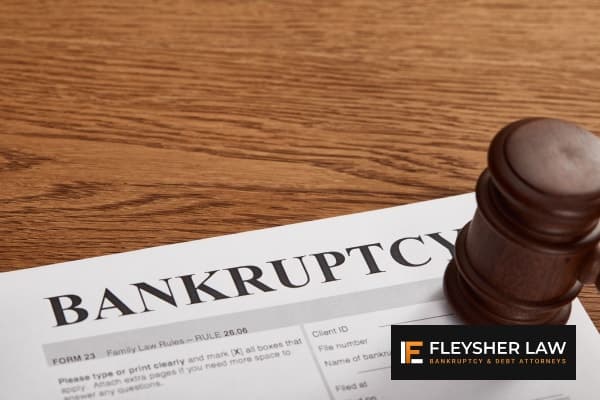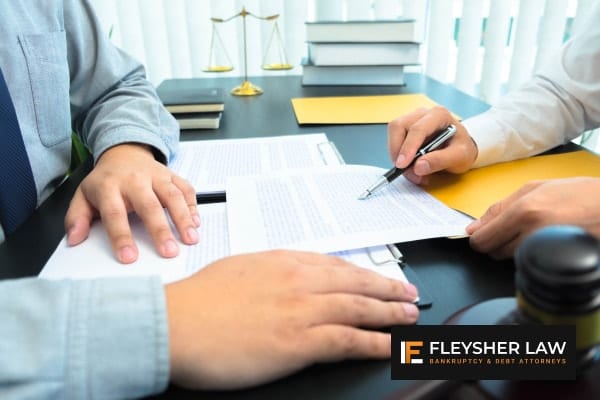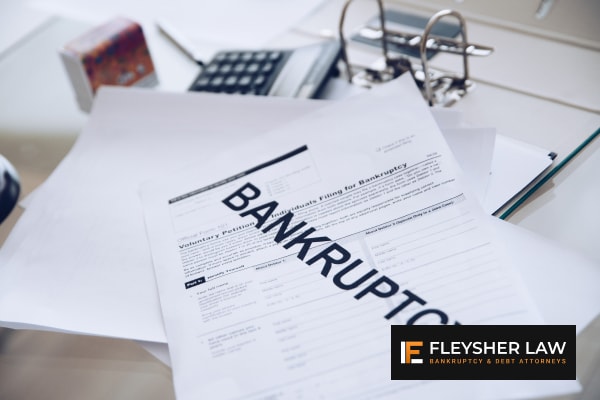This page was written, edited, reviewed & approved by Emil J. Fleysher following our comprehensive editorial guidelines. Emil J. Fleysher, the Founding Partner, has 15+ years of legal experience as a bankruptcy attorney. Our last modified date shows when this page was last reviewed.

Filing for bankruptcy is a significant financial decision that can provide relief during difficult times. However, knowing the benefits and challenges of the bankruptcy process is essential. Bankruptcy can help you manage overwhelming debt, but it also carries consequences that may affect your financial future. Learning about these effects can help you make an informed decision.
Bankruptcy is not a one-size-fits-all solution; its impact depends on your situation. It can offer a fresh start by eliminating debts but may also affect your credit and ability to secure loans. At Fleysher Law, we are here to help you explore the consequences of bankruptcy, both positive and negative, and provide tips for moving forward after filing. With the right information, you can regain control of your financial future.
Bankruptcy is a legal process designed to help individuals or businesses who cannot repay their debts. It provides a way to eliminate or restructure debts under the bankruptcy court's supervision. For many people, bankruptcy offers a chance to start over financially by reducing the burden of overwhelming debt. It's a tool meant to balance the interests of debtors and creditors.
While bankruptcy can provide relief, it is not without its challenges. The process involves legal and financial consequences that must be carefully considered. Bankruptcy filing can affect your credit report and future borrowing capabilities. However, it also offers an opportunity to regain financial stability and rebuild your life.
Chapter 7 (Liquidation Bankruptcy):
Chapter 7 bankruptcy eliminates most unsecured debt, such as credit card debt and medical bills. It involves liquidating non-exempt personal assets to repay creditors, but exemptions often protect essential property. This option is best for those with limited income who cannot afford monthly payments under a repayment plan. While it provides a clean slate, it remains on your credit report for up to 10 years.
Chapter 13 (Reorganization Bankruptcy):
Chapter 13 bankruptcy allows individuals to reorganize their debts into a manageable payment plan. Debtors make monthly payments to creditors over three to five years, often retaining their personal assets. This option suits those with regular income who want to avoid liquidation bankruptcy. Chapter 13 appears on your credit report for seven years and helps rebuild financial stability through structured repayments.
Many misconceptions surround bankruptcy, leading to unnecessary fear. A few myths that need to be debunked include:
Knowing the truth about bankruptcy can help you make informed decisions.
It's important to separate fact from fiction when considering whether to declare bankruptcy.

While bankruptcy carries some challenges, it also offers key benefits that can help you gain control of your finances. A few reasons why you might want to file for bankruptcy protection include:
An automatic stay is triggered once you ask for bankruptcy protection, halting creditor harassment and collection activities. This includes stopping wage garnishments, repossessions, and foreclosure proceedings. The bankruptcy court ensures that creditors must cease contacting you directly. This immediate relief provides breathing room to focus on resolving your financial situation.
Bankruptcy discharges many unsecured debts, including credit card debt and medical bills. A discharge means you are not required to repay these debts. This allows you to free up income for essential expenses like monthly payments on secured debt. Eliminating these burdens gives you a fresh start to rebuild your financial future.
After completing bankruptcy, you can begin rebuilding your finances. Reduced debt obligations allow you to focus on saving and planning for the future. Many people use this opportunity to adopt better financial habits and create a debt management plan. With time and effort, bankruptcy can be a turning point for long-term stability.
Bankruptcy does come with drawbacks that require careful consideration. A few of the negative consequences that filing for bankruptcy could trigger include:
A bankruptcy filing significantly impacts your credit score and stays on your credit report for several years. Chapter 7 stays for up to 10 years, while Chapter 13 remains for seven years. This can make obtaining loans or credit more challenging in the short term. However, you can improve your credit over time with responsible financial behavior.
Lenders view bankruptcy as a risk factor, making getting approved for credit cards or loans more difficult. If approved, you could face higher interest rates or stricter terms. This may harm your ability to buy a home or secure financing for other needs. Over time, demonstrating financial responsibility can rebuild trust with lenders.
In Chapter 7 bankruptcy, some non-exempt assets may be sold to repay creditors. While exemptions protect essential items like your home and car, luxury assets could be at risk. It's important to review what property qualifies as exempt before filing. A bankruptcy attorney can review your options and minimize asset loss.

Bankruptcy provides long-term benefits, such as a fresh start and relief from crushing debt. Eliminating unsecured debt frees up income for savings and essential expenses. It also encourages better financial habits, such as budgeting and credit counseling.
Conversely, bankruptcy remains on your credit report for several years, harming your borrowing power. It may limit access to favorable loan terms and affect future financial opportunities. Weighing these positives and negatives is essential when deciding to declare bankruptcy.
WWhile bankruptcy has its challenges, a few steps can help you recover faster. A few key tips to keep in mind include:
Taking these steps will help you recover from bankruptcy and regain financial stability. Before declaring bankruptcy, you should schedule a consultation with our office. While not all debts are dischargeable, we can help you put yourself in the best position possible to move forward.

Bankruptcy can be the right option in certain situations. A few situations where personal bankruptcy filings can be right for you include:
Evaluating these factors with an attorney can help determine if bankruptcy is your right choice. If you are having trouble paying back a car loan or credit card debt, reach out to our team today. Let's review your options and help you find the right path forward.
A Florida bankruptcy lawyer can guide you through the complexities of the bankruptcy process. They ensure your filing complies with state and federal laws. An attorney helps protect your personal assets and maximize exemptions during the process.
A lawyer also advocates for you in bankruptcy court, presenting a strong case for debt relief. They provide advice tailored to your specific situation, ensuring the best possible outcome. By partnering with a skilled attorney, you can confidently work through bankruptcy with confidence.

Filing for bankruptcy is a serious decision that requires expert guidance. At Fleysher Law, our experienced team can help you understand your options and make the best choice for your future. We always put our clients first, and we can do the same for you. Contact us today for a free consultation with a Florida bankruptcy lawyer. Let us help you overcome your financial challenges and prepare for a fresh financial start.

Emil specializes in consumer bankruptcy, debt settlement, and mortgage modification, offering a holistic approach to solving mortgage and debt problems. Emil listens to clients, understands their circumstances and goals, and helps them make the right choices by presenting all options and contingencies.
He is dedicated to helping South Floridians regain their financial freedom from overwhelming debt caused by high interest credit cards, bad mortgage loans, and uninsured medical expenses.

"*" indicates required fields